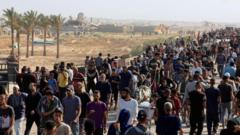Johnnie Moore, the leader of the Gaza Humanitarian Foundation (GHF), addressed the escalating situation in Gaza, where hundreds have reportedly been killed while seeking aid from GHF's distribution points. In a recent interview, Moore disputed claims that all casualties were directly related to the GHF's operations, suggesting that misinformation was being spread by UN agencies and other organizations. The GHF's approach has faced strong criticism from international bodies, particularly after a series of deadly incidents that began soon after the group took over aid distribution in late May.
GHF Leader Defends Gaza Aid Amid Rising Casualties

GHF Leader Defends Gaza Aid Amid Rising Casualties
The head of a contentious U.S. and Israeli-backed humanitarian group speaks out in the face of claims linking their aid distribution to rising Palestinian casualties.
As the conflict continues, with more than 56,000 reported fatalities in Gaza, the GHF aims to provide millions of meals, despite acknowledging the inefficiencies in their operations. The U.S. recently announced significant funding for the GHF, amid ongoing controversy surrounding the safety and efficacy of aid in the region.
The ongoing humanitarian crisis in Gaza has intensified scrutiny of aid operations, and Moore's remarks reflect the complex dynamics at play as organizations attempt to assist amidst conflict and chaos.
The Gaza Humanitarian Foundation (GHF) continues to face criticism over the safety of its aid distribution methods, with rising casualties among Palestinians as they seek help. Johnnie Moore, GHF's head, responded to allegations about the number of deaths near aid sites, claiming they are unfounded and dismissing accusations that the organization's operations are solely responsible for the violence. He emphasized that casualties attributed to GHF are complex, involving multiple factors amid the ongoing conflict.
The GHF has been condemned by UN officials, including Secretary-General Antonio Guterres, who labeled the aid operations as "inherently unsafe." Reports indicate that over 500 Palestinians have been killed, with thousands injured while attempting to receive aid since GHF began its work. The Israeli military's actions during these incidents have further complicated the narrative, with conflicting viewpoints on whether their operations target civilians.
Despite the chaos, the GHF is striving to reach a goal of delivering around 50 million meals to Gaza, a stark comparison to the desperate needs of the local population. As GHF navigates a treacherous landscape of political and military tension, their mission to alleviate hunger persists, while the humanitarian crisis deepens. The U.S. government's recent financial support further underscores the international community's dilemma in addressing the complex realities in the region.
The ongoing humanitarian crisis in Gaza has intensified scrutiny of aid operations, and Moore's remarks reflect the complex dynamics at play as organizations attempt to assist amidst conflict and chaos.
The Gaza Humanitarian Foundation (GHF) continues to face criticism over the safety of its aid distribution methods, with rising casualties among Palestinians as they seek help. Johnnie Moore, GHF's head, responded to allegations about the number of deaths near aid sites, claiming they are unfounded and dismissing accusations that the organization's operations are solely responsible for the violence. He emphasized that casualties attributed to GHF are complex, involving multiple factors amid the ongoing conflict.
The GHF has been condemned by UN officials, including Secretary-General Antonio Guterres, who labeled the aid operations as "inherently unsafe." Reports indicate that over 500 Palestinians have been killed, with thousands injured while attempting to receive aid since GHF began its work. The Israeli military's actions during these incidents have further complicated the narrative, with conflicting viewpoints on whether their operations target civilians.
Despite the chaos, the GHF is striving to reach a goal of delivering around 50 million meals to Gaza, a stark comparison to the desperate needs of the local population. As GHF navigates a treacherous landscape of political and military tension, their mission to alleviate hunger persists, while the humanitarian crisis deepens. The U.S. government's recent financial support further underscores the international community's dilemma in addressing the complex realities in the region.



















